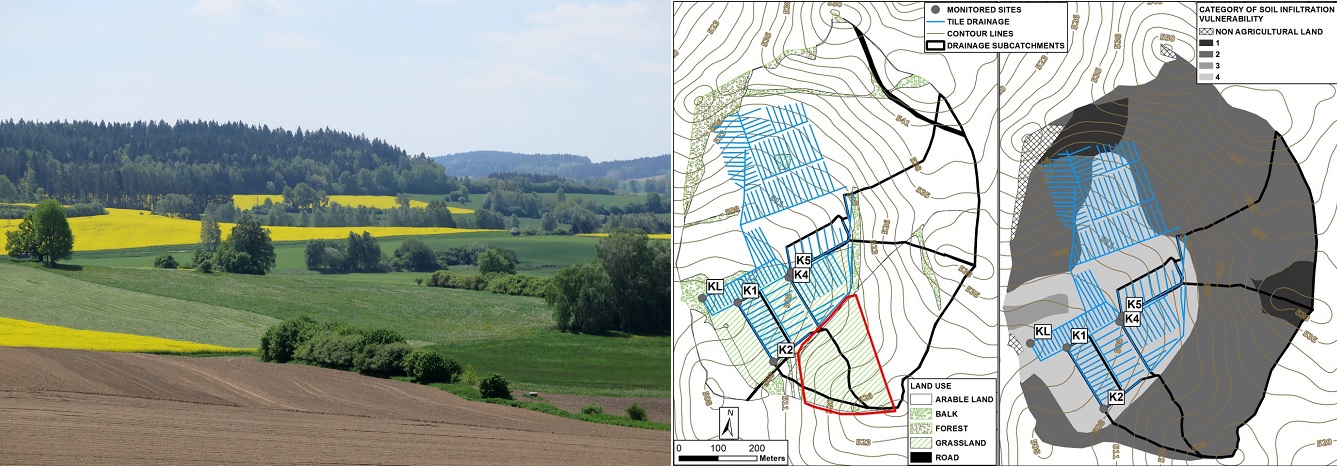Name of Pilot Area: Dehtáře
Country: Czech Republic
Region: Region: Bohemo-Moravian Highlands; Disctrict: Pelhřimov
Altitude / Topography: 497.0 – 549.8 m a.s.l.
Average annual rainfall: 660 mm
Average annual ET: 450-500 mm (during growing season)
Challenges: Groundwater contamination by intensive agriculture, Groundwater pollution problems – drinking water reservoir catchment for Prague, soil erosion, no irrigation
User(s): Zemědělské druzstvo Kojčice (Agricultural Cooperative); SPV Pelhřimov, a.s. (joint-stock company)
Pilot focus: WSN coupling; VRT upscaling
Current situation:
The pilot area Dehtáře is situated in the south-west Bohemo-Moravian Highland (Czech Republic), at 49°28´ N – 15° 12´ E, close to Pelhřimov town. The fields in Dehtáře are not irrigated, which is a special feature of this case study compared to all other FATIMA pilot areas. The experimental site was established in late 1970´s for the research of linkages between land use and management in various geomorphological zones and water quantity and quality dynamics. Dehtáře has an area of 59.6 ha, with tile drained areas occupying 19 ha (~32%). The catchment area is mainly agricultural land (89.3%). Minor forested areas (3.3%) lie at its northwestern and northern borders. Grassland (20.3%) covers the southern part of the catchment, as well as the adjacent lowest lying southwestern area, which is tile-drained. The remaining area (69%) is arable land, which is used mainly for production of cereals. The catchment geomorphology belongs to the erosion-accumulation relief type. The altitude ranges between 497 and 550 m. Dehtáře site is located within the Svihov drinking water reservoir catchment, on the Zelivka river. Svihov reservoir is Czech largest surface drinking water supply for Prague and Central Bohemia. The whole Zelivka river basin is designated as a nitrate vulnerable zone. The main crops are cereals (winter wheat, spring barley), winter rape, potatoes and red clover.
In the vicinity of Dehtáře, there occur some agri-environmental problems related to farming management. Surface, drainage and groundwater pollution by nitrates persists. In the year 2015, a lack of precipitation and thus available soil water content occurred. This year, a problem with shortage of potable water araised in some nearby villages and potable water was distributed in tanks. On the other hand, in the same region, flood protection measures are desirable to prevent property damages after torrential rains in some years. As in many other sites in the region, there are problems with functioning and maintenance of land drainage. A prevailing challenge still to be addressed is soil erosion. Kojčice farm, a local traditional agricultural cooperative, engaged in Fatima, is eager in new technologies as well as machinery for precise farming. However, as many of the farmers around, they need information what is worth / necessary to do regarding the new farming approaches in the view of maintaining / enhancing crop yields with simultaneous soil and water conservation. A typical current approach is the excessive and homogeneous use of fertilizer with a little regard to different yield potential of fields with different soil conditions.

